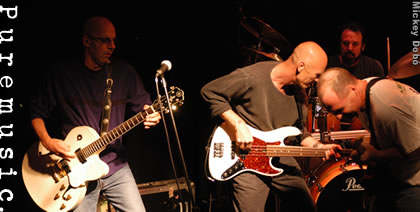
A Conversation with Pat McLaughlin (continued)
PM: And so the first record didn't come until sometime later, right? Early 80s?
Pat: I think maybe around '80, Jim Rooney got me a record. He got me a little budget out of Appaloosa, in Italy. A lot of people in Nashville have been fortunate enough to get Appaloosa to give them a little money to make a record.
PM: There was a Nashville-Italian connection as early as '80?
Pat: Yeah, with Rooney.
PM: With Rooney. And who were the Appaloosa people?
Pat: I can't remember the guys--Giovanni Bonandrini, he was one of them.
PM: And so you got a record out of that, Appaloosa.
Pat: Uh-huh. And that record showed up in like one of those huge Rounder catalogs, those really fat kind of newsprint catalogs full of records. And from then on I just--that was my first one, and then I made one myself. And then I made two for Capitol. Then I got lucky and went to Los Angeles and made my--I had my pop record experience.
PM: Right. Well, yeah, let's cover that. So how did you get lucky? And by then it's '85-ish?
Pat: Yeah, '85 or '86.
PM: So you were a singer songwriter or a band guy at this point?
Pat: Oh, I had a band. I was playing at 12th & Porter. And Steve Berlin and Mark Linnett were two L.A. guys who were playing with me. Berlin's now the sax player for Los Lobos.
PM: Right.
Pat: And Linnett is a really talented guy. He's an engineer and had done all kinds of cool stuff--and still does. They came to 12th & Porter, and we were playing. And they started the wheels kind of turning on working my publisher for an angle to get out to L.A. to try to get a deal and make some recordings. And we did that. At the time I was writing for EMI. I did manage to get a couple publishing deals along the way, staff writing deals. By that time, by the mid '80s, I'd had a couple publishing deals with different people. At that time I was with EMI. So they saw that as probably a source of funds for doing some recording and going after a deal. And then we ended up successful in doing that.
PM: And was Hale Milgrim at Capitol at the time? Did you know him?
Pat: It was the guy previous to him. I can't remember his name. And he can't remember mine, either, believe me.
PM: [laughs]
Pat: And God dang, I can't remember his name. But Mitchell Froom had signed a deal with Capitol, and he came to see us. And I ended up signing with Capitol to work with Mitchell.
PM: Right.
Pat: And then--
PM: What was he like way back then?
Pat: Mitchell Froom?
PM: Yeah.
Pat: Well, I don't know. I haven't seen him since way back then, so--he's just an easy going guy who plays great keyboards, and has a nice way of being in a studio. And he's competent in his sort of vision. He's a really good guy. He's really fun, actually.
PM: Yeah.
Pat: And we had a big budget, so I got to play with Jim Keltner and Jerry Marotta. [top shelf drummers in anyone's book]
PM: Right. And who played bass?
Pat: Oh, man... Let's see, the name is just getting away from me. It was Jerry Scheff. Elvis' bass player. I mean, it was really heavy duty. It was really fun. I never moved there, but Capitol got me a monthly thing. And I got to do the thing. I got management, the guy that was managing Bruce Hornsby, and did a tour in I think '88 opening for Bruce Hornsby.
PM: Really? And was George Marinelli playing with Bruce at the time?
Pat: Yeah. Yeah, I met all those guys. And we did pretty well. And I had a great band. Berlin had put a band together for me with Billy Bremner, the guy from Rockpile and--
PM: Wow.
Pat: And it was just kind of a lot going on. A lot of traveling back and forth to Los Angeles. It was a lot of fun.
PM: So that first Capitol record is called?
Pat: It's just one of those self titled--
PM: Pat McLaughlin.
Pat: Yeah. continue